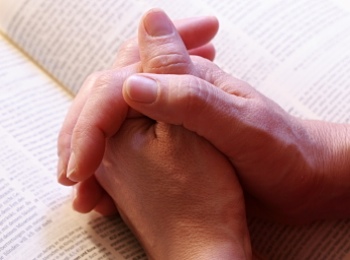I blew it yesterday. Once again, I acted like an immature girl rather than the mom of three who teaches parenting classes. I teach SCREAMFREE parent classes, for heaven's sake! Yes, I blew it royally. My teenage son had been ranting and then simply turned his rant on me. He didn't say much, but it hit a nerve, and I let loose. I'd been holding it together up until that point, but underneath the surface, the lava had been building and suddenly Mount Momma exploded. And did I explode!
I got up, looked him in the eye, and proceeded to unleash my fury. The finger was wagging, the voice was loud, and I'm certain that smoke was coming out of my ears. It was not a pretty sight, and the words were not pretty either. More like venomous and hateful. Painful.
 You know what was especially painful? Seeing the look in his eyes as I ranted on and on. He just shut down emotionally and had a look on his face that said, "I've lost all respect for you." I became even angrier as I saw that look on his face, but my anger was less directed at him and more directed at me. How could I do this again? Why did I let my emotions get the upper hand once more? Here I was - the mom, the "mature one," the "parenting expert" - and I was the one who was being immature. I was not acting in a respectable way.
You know what was especially painful? Seeing the look in his eyes as I ranted on and on. He just shut down emotionally and had a look on his face that said, "I've lost all respect for you." I became even angrier as I saw that look on his face, but my anger was less directed at him and more directed at me. How could I do this again? Why did I let my emotions get the upper hand once more? Here I was - the mom, the "mature one," the "parenting expert" - and I was the one who was being immature. I was not acting in a respectable way.
Have you been there?
Have you lost it with your kids?
After you calm down and have time to think back over the scene, do you ever regret those words, the attitude, the damage to your relationship?
Thankfully, for me, those experiences are far less frequent than they were several years ago, but I still find myself emotionally exhausted afterwards and wondering what happened and how I can prevent it from happening again. Last night as I lay in bed reliving and regretting, I was reminded again of some truths I've learned on this parenting journey.
I need to focus on myself.
I need to look at the interaction and evaluate what I did wrong. It's so easy to focus on my son's behavior and think, "If he wouldn't have said what he did, I wouldn't have yelled at him." Yeah, I know. I've thought that a lot! In "reality-ville", though, I am responsible for my behavior regardless of how he acts. His immaturity does not condone mine. That does not mean I don't address what he did wrong. Certainly, my role as a parent is to instruct him in proper behavior, but that starts with modeling proper behavior. Why should I be surprised that he flies off the handle when things don't go his way if he consistently sees me doing the same thing? First, I need to look at myself.
What I did and what I said was wrong. Period. End of story. There is no rationalizing what I did. Furthermore, my behavior and my words hurt my son and hurt our relationship. As a result, I needed to apologize to him. Now to be honest, I was still angry most of the day and it was only after really sitting with my emotions late last night after he'd gone to bed that I was at a place where I was ready to sincerely apologize to him, so I got up early to have breakfast with him before he left for school. I told him that I was sorry for what I had done. He didn't have a response for me, but that's ok. I need to give him space to deal with his own emotions in his timing.
Forgiveness does not end with my apology, however. Too many times, we, as parents, carry around resentments toward our kids for things that they have done that have offended us or even hurt our feelings (direct defiance, "I hate you!"). Those offenses have a tendency to bruise our relationship with our kids. Several years ago, I began to recognize this in my own relationship with my children, so I wrote down every single offense that they had done that still bothered me and across the paper I wrote "FORGIVEN." Then I burned the paper in the fireplace. What a freeing act! Even if my kids never apologize for the things they do that hurt me, my response needs to be the same: forgiveness. It's an act of love. In fact, the Bible says it best, "Love keeps no record of wrong" (1 Corinthians 13:3 NIV).
Prepare for the next incident.
Now I know this seems ridiculous in one sense. Why would I want to prepare for battle with my child? Actually, if we don't prepare, more than likely we will have a battle. What we need to do is anticipate what is going to set us off and practice how we might handle it in a calm and connected way. When we mentally practice appropriate responses, we are far more likely to act appropriately in the heat of the moment.
Have you ever noticed that you say irrational things or act wildly when your adrenaline starts rushing? Here is what Dr. Robert Bolton, in his book, People Skills, says about the effects of adrenaline:
Emotional arousal actually makes us different people than who we are in moments of greater calmness. When we are angry or fearful, our adrenaline flows faster and our strength increases by about 20 percent. The blood supply to the problem-solving part of the brain is severely decreased because, under stress, a greater portion of blood is diverted to the body's extremities. [Also, an increase in] adrenaline suppresses activity in areas at the front of the brain concerned with short-term memory, concentration, inhibition, and rational thought. This sequence of mental events allows a person to react quickly to [conflict], either to fight or to flee from it. But it also hinders the ability to handle rational problem solving.
 So in other words, adrenaline changes us and prevents us from doing and saying what we would in calm moments. I can certainly testify to that! We are not able to think or speak rationally and as a result, we allow our emotions (and adrenaline) to rule us rather than letting the rational, problem solving aspect of ourselves dominate.
So in other words, adrenaline changes us and prevents us from doing and saying what we would in calm moments. I can certainly testify to that! We are not able to think or speak rationally and as a result, we allow our emotions (and adrenaline) to rule us rather than letting the rational, problem solving aspect of ourselves dominate.
So if the "rational me" is best accessed during the calm moments, then preparing for the next incident might prevent it from becoming an irrational, explosive battle.
So if you've recently had your own blow up, take it from another Mount Momma and learn to focus on yourself, seek forgiveness, and prevent by preparing!











Comments
Have thoughts on this article? Leave a comment